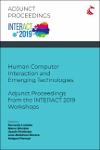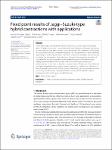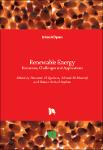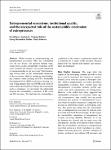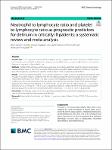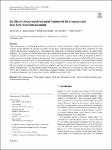Search
Author
- Osman, Ahmed I. (5)
- Daqing, Ma (3)
- Jorgensen, Ed (3)
- Li, Yan (3)
- next >
Subject
- kinh tế (26)
- Economics (12)
- programming (10)
- XRD (10)
- next >
Date issued
- 2020 - 2025 (2129)
- 2010 - 2019 (129)
- 2000 - 2009 (9)
- 1999 - 1999 (1)
Has File(s)
Search Results
The INTERACT Conferences are an important platform for researchers and practitioners in the field of human-computer interaction (HCI) to showcase their work. They are organised biennially by the International Federation for Information Processing (IFIP) Technical Committee on Human-Computer Interaction (IFIP TC13), an international committee of 30 member national societies and nine Working Groups. INTERACT is truly international in its spirit and has attracted researchers from several countries and cultures. With an emphasis on inclusiveness, it works to lower the barriers that prevent people in developing countries from participating in conferences. As a multidisciplinary field, HCI requires interaction and discussion among diverse people with different interests and backgrounds. T... |
We organize the modified trace theory with the use of the Nakayama functor of finite abelian categories. For a linear right exact functor Σ on a finite abelian category M, we introduce the notion of a Σ-twisted trace on the class Proj(M) of projective objects of M. In our framework, there is a one-to-one correspondence between the set of Σ-twisted traces on Proj(M) and the set of natural transformations from Σ to the Nakayama functor of M. Non-degeneracy and compatibility with the module structure (when M is a module category over a finite tensor category) of a Σ-twisted trace can be written down in terms of the corresponding natural transformation. |
This paper introduces a computational method for generating metric Travelling Salesman Problem (TSP) instances having a large integrality gap. The method is based on the solution of an integer programming problem, called IH-OPT, that takes as input a fractional solution of the Subtour Elimination Problem (SEP) on a TSP instance and computes a TSP instance having an integrality gap larger than or equal to the integrality gap of the first instance. The decision variables of IH-OPT are the entries of the TSP cost matrix, and the constraints are defined by the intersection of the metric cone with an exponential number of inequalities, one for each possible TSP tour. |
In this manuscript, a novel general class of contractions, called Jaggi–Suzuki-type hybrid (G-α-ϕ)-contraction, is introduced and some fixed point theorems that cannot be deduced from their akin in metric spaces are proved. The dominance of this family of contractions is that its contractive inequality can be specialized in various manners, depending on multiple parameters. Nontrivial comparative examples are constructed to validate the assumptions of our obtained theorems. Consequently, a number of corollaries that reduce our result to some prominent results in the literature are highlighted and analyzed |
The demand for secure, affordable and clean energy is a priority call to humanity. Challenges associated with conventional energy resources, such as depletion of fossil fuels, high costs and associated greenhouse gas emissions, have stimulated interests in renewable energy resources. For instance, there have been clear gaps and rushed thoughts about replacing fossil-fuel driven engines with electric vehicles without long-term plans for energy security and recycling approaches. This book aims to provide a clear vision to scientists, industrialists and policy makers on renewable energy resources, predicted challenges and emerging applications. It can be used to help produce new technologies for sustainable, connected and harvested energy. A clear response to economic growth and clean ... |
While research on entrepreneurship and entrepreneurial ecosystems (EEs) has consolidated over the last decade, one question remains unanswered: how can the sustainability orientation of EE actors facilitate the intensity and growth orientation of entrepreneurship in the ecosystem? Entrepreneurship activity relies on the sustainability orientation of the ecosystem, which is lacking in most developing countries where reaching the UN’s Sustainable Development Goals (SDGs) is the most pressing concern. Using primary data on 1789 EE actors from 17 cities in East and South-East Europe and econometric analysis techniques, we investigate the relationship between the sustainability orientation of EE actors and EE outcomes. |
As many automated algorithms find their way into the IT systems of the banking sector, having a way to validate and interpret the results from these algorithms can lead to a substantial reduction in the risks associated with automation. Usually, validating these pricing mechanisms requires human resources to manually analyze and validate large quantities of data. There is a lack of effective methods that analyze the time series and understand if what is currently happening is plausible based on previous data, without information about the variables used to calculate the price of the asset. This paper describes an implementation of a process that allows us to validate many data points automatically. |
This special issue provides a collection of 15 papers with modern theories and applications for circular economy, engineering projects, entrepreneurship models, and investor decisions. After the commencing review on Occupational Health and Safety Management-Systems Standards, follow papers which can be classified into four categories which cover the overall scope of special issue. The first category includes papers regarding the micro-level of circular economy. This means case studies in firm-level which implement different techniques to achieve sustainable development and circular economy goals. The findings reveal interesting achievements which are associated with cultural characteristics of the countries these case studies have been conducted. The second category of papers refers... |
In this systematic review and meta-analysis, we aim to analyze the current literature to evaluate neutrophil to lymphocyte ratio (NLR) and platelet to lymphocyte ratio (PLR) values among critically ill patients who develop delirium as compared to those who do not. |
Video enhancement is a challenging problem, more than that of stills, mainly due to high computational cost, larger data volumes and the difficulty of achieving consistency in the spatio-temporal domain. In practice, these challenges are often coupled with the lack of example pairs, which inhibits the application of supervised learning strategies. To address these challenges, we propose an efficient adversarial video enhancement framework that learns directly from unpaired video examples. In particular, our framework introduces new recurrent cells that consist of interleaved local and global modules for implicit integration of spatial and temporal information. |

